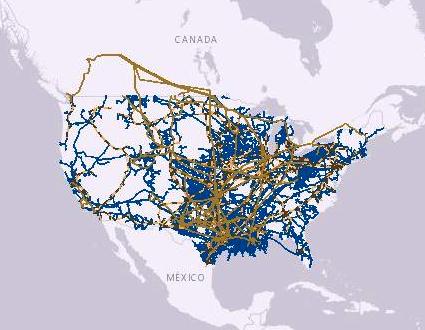Inspections are a Critical Link to Safety
There are critical positions that need to be filled in the energy sector, even in a downcycle. One growing area in oil and gas jobs is the need for qualified inspectors for oil and gas pipelines and other infrastructure projects.
Oil & Gas Jobs: 60 Natural Gas Pipeline Inspectors Needed for Projects in California
A California engineering and field technical services firm that specializes in natural gas, electric power and oil/liquids projects is presently interviewing qualified candidates to fill 60 positions for natural gas pipeline projects in northern and central California.
- $40-$65/hour depending on location and experience
- contract employment – at least 6 months
- strong possibility of a long term extension
[button link=”https://www.oilandgas360.com/job-openings-for-60-pipeline-inspectors/” color=”orange”]Pipeline Inspector Jobs – APPLY HERE[/button]

While TransCanada’s proposed Keystone XL pipeline served as a political football for eight years (and was finally rejected by President Obama), numerous other pipeline projects across North America have marched forward. Why? Because the energy on which the country depends has to be moved safely from production sites to end user. Gathering systems and major pipelines are under construction, in permitting phase or coming online in basins across the country.
Recent leaks tied to aging infrastructure or acts of God have been in the news, and as a result, the federal government and Congress are taking steps to beef up the rules when it comes to ensuring safety and environmental protection in the movement and storage of energy.
An article this week in the Arkansas Democrat-Gazette sets the stage:
“Almost 10 months after a 63-year-old pipeline burst in the Arkansas River — sending two large spouts of water skyward as it released natural gas into the river — a federal agency is proposing new natural gas safety rules aimed at toughening regulations and reducing pipeline incidents.
The proposed rules by the U.S. Department of Transportation’s Pipeline and Hazardous Materials Safety Administration come as there’s growing awareness of the nation’s aging infrastructure and the strain that’s being placed on it as companies move more crude and natural gas than ever before as a result of the U.S. shale boom.
The new regulations proposed by the pipeline agency primarily address safety protocols for aging pipelines and lines in moderately populated area, but it also recommends changes to the way companies secure and inspect natural gas pipelines after extreme-weather events, such as flooding.”

Gas Pipeline Inspectors Needed – Oil & Gas 360
A leak at the Aliso Canyon, California, gas storage field also exposed the need to improve inspection and monitoring protocols for the aging energy storage infrastructure.
In Kansas, state regulators are trying to iron out how to pay for underground replacement of aging pipelines. “Thousands of miles of pipe carrying natural gas in Kansas is deteriorating, and three Kansas gas companies went before the Kansas Corporation Commission on Wednesday to make the case for an accelerated program and financing to replace aging and obsolete infrastructure,” the Topeka Capital-Journal reported Wednesday.
“Atmos Energy, Black Hills Energy and Kansas Gas Service officials brought samples of corroded pipe to KCC commissioners to highlight their request for additional ways to fund pipeline replacement. Though all three companies testified their gas systems were safe — a fact supported by federal data showing gas incidents have decreased or flatlined in recent years — Atmos and Black Hills expressed dissatisfaction with the rate at which they are able to replace obsolete pipe under their current rate structure,” the newspaper reported.
“’At the current pace, it will take 187 years before all the obsolete pipe on the Atmos system is replaced’,” said Jim Jeffries, attorney for Atmos.”
Several governmental bodies and industry groups are working to improve overall safety by strengthening regulations that apply to the nation’s energy infrastructure. Besides the U.S. Dept. of Transportation’s Pipeline and Hazardous Materials Safety Administration’s proposed new rules mentioned above, earlier this month the U.S. House of Representatives’ Energy and Power Subcommittee began marking up a wide-ranging bill that would update the country’s pipeline regulations. The draft bill is called the Pipeline Safety Act of 2016.
The American Petroleum Institute (API) has launched a program to certify pipeline inspectors.
[button link=”https://www.oilandgas360.com/job-openings-for-60-pipeline-inspectors/” color=”orange”]Pipeline Inspector Jobs – APPLY HERE[/button]







